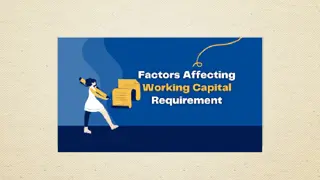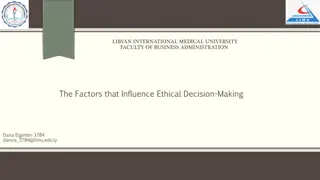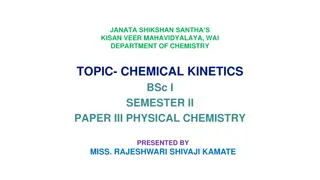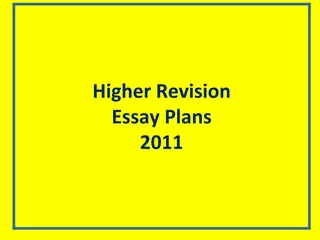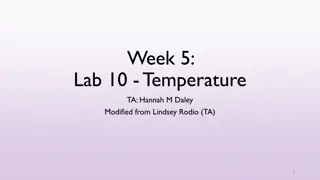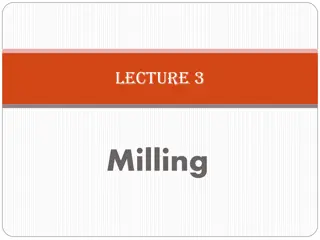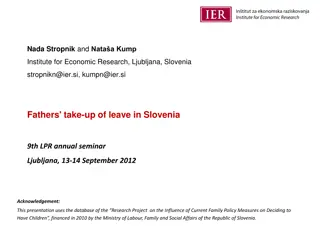
Understanding Factors Affecting Learning Process
Explore the various factors influencing learning, from individual differences to encoding activities and general principles of learning. Delve into memory strategies, different forms of learning, and the impact of motivation, working memory, anxiety, and expertise on the learning process.
Download Presentation

Please find below an Image/Link to download the presentation.
The content on the website is provided AS IS for your information and personal use only. It may not be sold, licensed, or shared on other websites without obtaining consent from the author. If you encounter any issues during the download, it is possible that the publisher has removed the file from their server.
You are allowed to download the files provided on this website for personal or commercial use, subject to the condition that they are used lawfully. All files are the property of their respective owners.
The content on the website is provided AS IS for your information and personal use only. It may not be sold, licensed, or shared on other websites without obtaining consent from the author.
E N D
Presentation Transcript
Factors Influencing Learning [Professor Name] [Class and Section Number]
Learning Objectives 1. Consider what kinds of activities constitute learning. 2. Name multiple forms of learning. 3. List some individual differences that affect learning. 4. Describe the effect of various encoding activities on learning. 5. Describe three general principles of learning.
Warm Up: Learning Strategies Write answers to the following questions What memory strategies do you use? What do you do when you want to learn something? What strategies do you use to study for a test? Pair and Share Discuss: Why do you use these strategies?
Overview Introduction to Learning Differences in Learners Encoding Activities General Principles of Learning
Introduction to Learning Most of us just follow our gut when it comes to learning strategies Learning is a broader concept than it appears
Overview Introduction to Learning Differences in Learners Motivation Working Memory Anxiety Expertise Encoding Activities General Principles of Learning
Differences in Learners Motivation Not enhanced by $$ Prioritized, meaningful material = motivation
Differences in Learners Working Memory Reasoning Reading Comprehension Control of attention
Differences in Learners Anxiety Hurts working memory Write about it!
Differences in Learners Expertise Chase & Simon (1973) study of chess masters Chunking
Memory Activity XIBMSATMTVPHDX
Memory Activity X IBM SAT MTV PHD X
Overview Introduction to Learning Differences in Learners Encoding Activities How we learn is just as important as intention to learn Self-control of learning strategies Research-backed effective encoding strategies General Principles of Learning
Encoding Activities It s not just how hard you try to learn It s about how you encode the information! Incidental vs. intentional learning Survival processing
Self-Control of Learning Strategies Control over our learning methods can be helpful IF we spend more time on difficult material AND IF we restudy what we don t know as well
Research-backed Encoding Strategies Spacing out repetitions of study Interleaving (mixing) various skills Self-testing
Remembering Activity Serious Artistic Trusting Gentle Timid Warm Clumsy Lazy Loyal Rigid Reckless Brave Honest Rude Wise Tense
CAT: The Muddiest Point What was the muddiest point in today s class? Write down what concept you are still struggling to understand.
Overview Introduction to Learning Differences in Learners Encoding Activities General Principles of Learning The value of effective metacognition Transfer-appropriate processing The value of forgetting
Video and Discussion The U.S. Memory Champion Let s watch a video about how the U.S. Memory Champion trains
General Principles of Learning Metacognition Monitoring and controlling learning A sense of what we have mastered We can improve by self- testing!
General Principles of Learning Transfer-appropriate processing Learning is revealed by particular tests Memory is better when test mirrors the encoding activity Think about the situation in which you will need the information
General Principles of Learning The value of forgetting Forgetting is good! Unclutters our memories Helps spaced-out learning become more durable
The Spacing Effect Activity Message Basket Basket Fashion Justice Justice Artist Supper Fashion Ticket Ticket Remark Cousin Message Leather Leather Artist Witness Witness Pattern Bottle Empire Empire Pattern Cousin Giant Giant Supper Remark Habit Habit Bottle
CAT: The One-Minute Paper What was the most important thing you learned during this class? What important question remains unanswered?
Photo Attribution Photo Credit: Woman geralt https://pixabay.com/en/woman-girl-icon-symbols-1197497/ https://creativecommons.org/publicdomain/zero/1.0/deed.en Slide 1 Photo Credit: the written word palo https://www.flickr.com/photos/paloetic/6381538651 https://creativecommons.org/licenses/by-nc-sa/2.0/ Slide 3 Photo Credit: Reminder3 bibliojojo https://www.flickr.com/photos/68509201@N08/6225702347 https://creativecommons.org/licenses/by/2.0/ Photo Credit: Carrot and the stick Nevit Dilmen https://en.wikipedia.org/wiki/Carrot_and_stick#/media/File:Carrot_and_stick_motivation.svg http://creativecommons.org/licenses/by-sa/3.0/ Slide 5 Slide 7 Photo Credit: Head geralt https://pixabay.com/en/head-brain-man-face-human-607480/ https://creativecommons.org/publicdomain/zero/1.0/deed.en Slide 8 Photo Credit: Self Portrait As A Stressed-Out Bride To Be Brittney Bush Bollay https://www.flickr.com/photos/tzofia/270800047 https://creativecommons.org/licenses/by-nc-nd/2.0/ Slide 9 Photo Credit: Closeup of chess king and queen Johnny Magnusson http://www.freestockphotos.biz/stockphoto/1773 http://creativecommons.org/publicdomain/zero/1.0/ Slide 10 Photo Credit: Brain geralt https://pixabay.com/en/brain-may-refer-to-face-head-194932/ https://creativecommons.org/publicdomain/zero/1.0/deed.en Slide 14 Photo Credit: Student studying UBC Learning Commons https://www.flickr.com/photos/56866338@N06/8726823600 https://creativecommons.org/licenses/by/2.0/ Slide 15 Photo Credit: Photo Credit: A plus Ludwig https://www.flickr.com/photos/ludwg/8668129713 https://creativecommons.org/licenses/by-nc-nd/2.0/ Slide 16 Photo Credit: Illustrated silhouette of a black cat nehtaeh79 http://www.freestockphotos.biz/stockphoto/16624 http://creativecommons.org/publicdomain/zero/1.0/ Slides 18 & 26
Photo Attribution Photo Credit: bordeaux JanDix https://pixabay.com/en/bordeaux-dog-de-dogue-water-muddy-895827/ https://creativecommons.org/publicdomain/zero/1.0/deed.en Photo Credit: Nelson Dellis Punknellis https://en.wikipedia.org/wiki/Nelson_Dellis#/media/File:Nelson_Dellis_Headshot.jpg https://creativecommons.org/licenses/by-sa/4.0/ Slide 19 Slide 21 Photo Credit: binaural-beat-digital-drug digitalbob8 https://www.flickr.com/photos/44568283@N02/4098316274 https://creativecommons.org/licenses/by/2.0/ Photo Credit: Making observations in the field. Indiana Dunes National Park BioBlitz. Image Credit: EOL. CC BY EOL Learning and Education Group https://www.flickr.com/photos/44919417@N04/6810492834 https://creativecommons.org/licenses/by/2.0/ Slide 22 Slide 23 Photo Credit: Elephants Never Forget Jim Bauer https://www.flickr.com/photos/lens-cap/7721541580/ https://creativecommons.org/licenses/by-nd/2.0/ Slide 24


